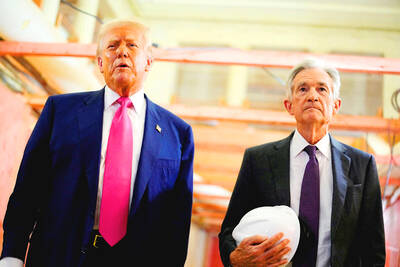The sale of a soon-to-be-completed shopping mall in Taipei County owned by a financially strapped appliance maker has attracted the interest of five potential buyers, the deal*s arranger said yesterday.
Taiwan Kolin (夆釱) is asking for NT$6 billion (US$182 million) for the mall in Sinjhuang City (蜪薧).
※There shouldn*t be any problem closing the deal by the third quarter of this year,§ Gordon Kao (邴棬艟), vice president of Savills Taiwan, said by telephone.
The shopping mall, the first and only one in the highly populated city, is expected to generate a return of NT$450 million per year for the new buyer, he said, adding that cash-strapped Kolin put the property up for sale last week.
The mall, located near Fu Jen Catholic University and a mass rapid transit (MRT) station that will start operations in 2012. It has a lot size of about 11,200 ping (37,000m昌) and total floor area of 32,000 ping (105,600m昌), the realtor said.
Nearly 57 percent of the factory-turned shopping mall*s floor space has been leased to retailers, including hypermarket RT-Mart (豇躽菕), Ambassador Theater (玿瑐蝭僗) and Toys※R§Us Inc.
Although construction of the NT$1.5 billion mall was halted late last year by the bankrupt owner, Kolin has promised to resume and complete the construction for the new buyer one year after the deal is sealed, Kao said.
According to Savills Taiwan, sales of local commercial properties reached NT$35.2 billion in the first six months of this year, a 60 percent growth year-on year. This shows continuing investor interest after the government eased restrictions on Chinese investment, it said.

IN THE AIR: While most companies said they were committed to North American operations, some added that production and costs would depend on the outcome of a US trade probe Leading local contract electronics makers Wistron Corp (緯創), Quanta Computer Inc (廣達), Inventec Corp (英業達) and Compal Electronics Inc (仁寶) are to maintain their North American expansion plans, despite Washington’s 20 percent tariff on Taiwanese goods. Wistron said it has long maintained a presence in the US, while distributing production across Taiwan, North America, Southeast Asia and Europe. The company is in talks with customers to align capacity with their site preferences, a company official told the Taipei Times by telephone on Friday. The company is still in talks with clients over who would bear the tariff costs, with the outcome pending further

NEGOTIATIONS: Semiconductors play an outsized role in Taiwan’s industrial and economic development and are a major driver of the Taiwan-US trade imbalance With US President Donald Trump threatening to impose tariffs on semiconductors, Taiwan is expected to face a significant challenge, as information and communications technology (ICT) products account for more than 70 percent of its exports to the US, Chung-Hua Institution for Economic Research (CIER, 中華經濟研究院) president Lien Hsien-ming (連賢明) said on Friday. Compared with other countries, semiconductors play a disproportionately large role in Taiwan’s industrial and economic development, Lien said. As the sixth-largest contributor to the US trade deficit, Taiwan recorded a US$73.9 billion trade surplus with the US last year — up from US$47.8 billion in 2023 — driven by strong

AI: Softbank’s stake increases in Nvidia and TSMC reflect Masayoshi Son’s effort to gain a foothold in key nodes of the AI value chain, from chip design to data infrastructure Softbank Group Corp is building up stakes in Nvidia Corp and Taiwan Semiconductor Manufacturing Co (TSMC, 台積電), the latest reflection of founder Masayoshi Son’s focus on the tools and hardware underpinning artificial intelligence (AI). The Japanese technology investor raised its stake in Nvidia to about US$3 billion by the end of March, up from US$1 billion in the prior quarter, regulatory filings showed. It bought about US$330 million worth of TSMC shares and US$170 million in Oracle Corp, they showed. Softbank’s signature Vision Fund has also monetized almost US$2 billion of public and private assets in the first half of this year,

POWELL SUCCESSOR: US Fed Governor Adriana Kugler’s resignation gives Donald Trump an opening on the board, potentially accelerating his decision on the next chair US President Donald Trump suddenly has a chance to fill an opening at the US Federal Reserve earlier than expected, after Fed Governor Adriana Kugler announced her resignation on Friday. It might also force him to pick the next Fed chair months sooner than he had anticipated. “The ball is now in Trump’s court,” LH Meyer/Monetary Policy Analytics Inc economist Derek Tang said. “Trump is the one who’s been putting pressure on the Fed to do this and that, and Trump says he wants to have his own people on. So now he has the opportunity.” Kugler’s exit unfolds amid unprecedented public pressure